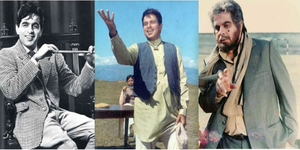New Delhi: The matchless thespian of Hindi cinema, he is still remembered for his understated, yet intense roles of brooding and star-crossed lovers, a smitten Mughal Crown Prince, a rustic simpleton-turned-outlaw, boisterous pranksters, dutiful policemen, and many more, yet Dilip Kumar’s most significant performance came in a private interaction when he — politely — rebuked a future Prime Minister in front of her father.
It would have remained a secret had not Dilip Kumar himself revealed the episode, involving him, Indira Gandhi, and Pandit Jawaharlal Nehru, in a speech at a public event decades later.
On the 102nd birth anniversary — December 11 — of Muhammad Yusuf Khan alias Dilip Kumar, Indian films’ abiding superstar, who left an unmatched legacy with just 57 films in a 54-year-long career, the story deserves to be retold.
As Dilip Kumar recalled, he had just been elected the President of the India Motion Picture Producers Guild, despite not running or being interested in the post, and had been invited to a breakfast meeting with Pandit Nehru.
While Dilip Kumar did not reveal the exact time of this meeting, it most likely took place in 1963 soon after he took over the post. The association’s welfare programmes, as he declaimed in his characteristic mix of eloquent English and Hindustani, had the twin aims of creating a social identity, civic consciousness, and credibility for the film industry, and telling the common people that the people of the industry did not just inhabit a world of make-believe but had concerns about their fellow citizens too.
Or as he put it: “Apne waqar ko establish karna tha, ke nahi hoshmand hai, ham ko khayal hai, apni society se muttaliq hai, apni zameen se vabasta hai, apne culture se muttaliq hai…”
He said that Prime Minister Nehru was aware of the special functions the film industry organised for disaster relief, education, and other social welfare objectives, and used to call him over to meet once in a while.
As the actor recalled, Mrs Gandhi was also present at this breakfast meeting and launched into a no-holds-barred broadside against the Hindi film industry, noting how she had visited Paris, Moscow, and London and seen their orchestras, their plays, and films there and how these were far advanced and better than their Indian counterparts. Furthermore, she said that there was “nothing Hindustani about Hindustani films.”
Dilip Kumar said that he kept quiet for the nearly 15 minutes or so that Mrs Gandhi harangued him, though inwardly losing his equanimity as she “began to overstep the bounds of decorum” with her “total condemnation of an entire medium”, which was “not justified at all.” He then thought it would not be rude if he responded to her strident criticism.
He then said, with extreme politeness, that he had been listening to her for 10 to 12 minutes as she criticised Hindustani films, “and you said a lot, which I admit is valid and denying it will be folly, it will be stupidity to claim that Indian films are the best. But let me tell you that you ask where is the ‘Hindustaniat in Hindustani films’ and in the 12 minutes you have been speaking, there has been no ‘Hindustaniat’ in your criticism, for you have not used a single Hindustani word… you have been speaking entirely in English.”
However, Dilip Kumar said that he did not stop his counter-attack, telling her that in spite of a “dedicated man at the helm of affairs,” the country had several problems.
“.. we don’t only have a film industry that is poor… we have roads that are poor, we have an educational system that is poor, we have an agriculture that is poor, and if I may put it to you, Madam, our administration also has several weak and even some ugly points,” he said to her.
The superstar did not reveal Mrs Gandhi’s response, but as quiet settled, feared that he had offended the Prime Minister. However, he recalled that it was Pandit Nehru who broke the silence, remarking: “You know, Yusuf, if I was you, I wouldn’t have been so polite.”
That was the prowess of the “shy 22-year-old son of a Pathan fruit merchant,” renamed Dilip Kumar by Devika Rani when he entered films in 1944 and “single-handedly refined histrionics” and refined acting “to an art form of exalted brilliance,” as per his wife Saira Banu.
Let alone his celluloid career, Dilip Kumar symbolised India’s diversity, capable of quoting from the Quran as well as the Bhagavad Gita and the Bible, celebrating Diwali as fervently as Eid and the ceremony marking the completion of Jain children’s arduous 30-day fast, and equally fond of Josh, Firaq, and Sahir as Sumitranand Pant, Bharti, and Tagore.
(Vikas Datta can be contacted at vikas.d@ians.in)
–IANS


Comments are closed, but trackbacks and pingbacks are open.